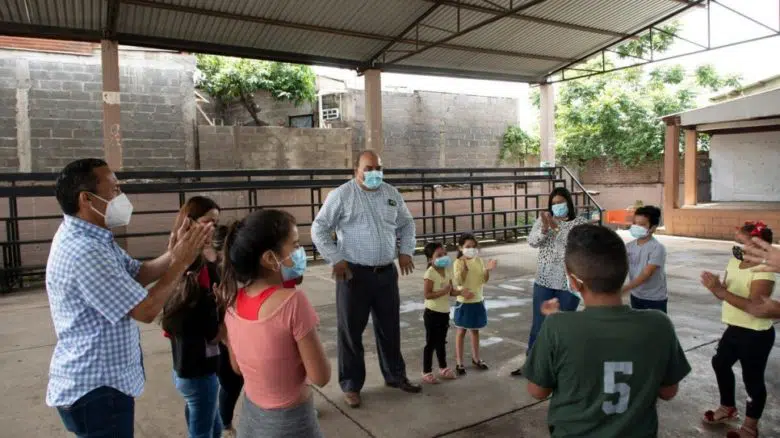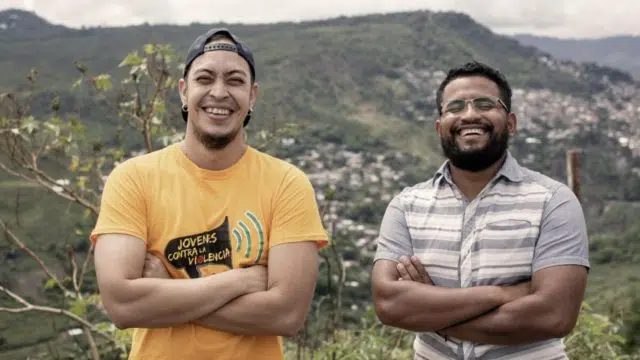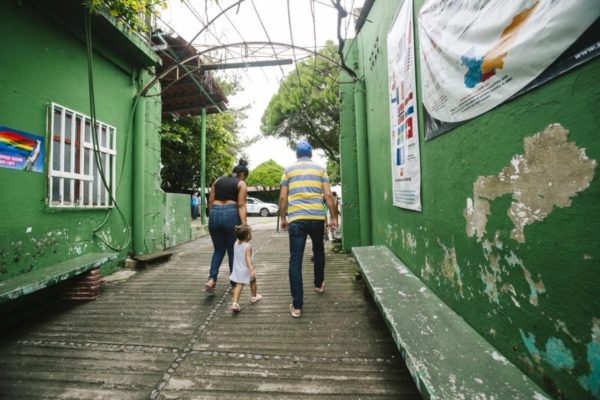
Schools in Honduras were once off-limits to gangs, but educators say that has changed.
© UNHCR/Biel Calderón
Honduran teachers are being disproportionately affected by the country’s gang violence.
By María Rubi in Tegucigalpa, Honduras
At the start of each new school year, principal Horacio Montes* braces not only for the arrival of his returning students but for much less welcome visitors — members of the gang that controls much of the Laureles* neighbourhood of the Honduran capital, Tegucigalpa, where Horacio’s school is located, demanding he hand over the keys.
It has become common practice throughout Honduras for gangs to use schools as safe houses to stash illicit drugs or weapons, and Horacio’s nursery-through-Grade Nine school is no exception.
“It used to be that schools were off-limits, spaces that were protected by the community,” said Horacio, 47. “But now you find that schools where they [the gang members] have infiltrated have become drug trafficking hubs.
“We’ve had kids practically stumble upon weapons [in school]”, he said. “They’ve found bullets and cartridges and they bring them to us.”
Such school “takeovers” are but one of the dangers that teachers in Honduras face. Some are forced to pay bribes to get to work, forking out money every time they cross the invisible borders that separate one gang’s territory from another’s. Others are victims of extortion, intimidation, and threats from gang members, who sometimes include their own students or their students’ parents. Female teachers are particularly vulnerable, as they can be targets for sexual harassment or even sexual assault.
“We have seen several of our colleagues killed in the line of duty.”
As trusted adults, Honduran teachers also find themselves on the front lines of internal displacement, which is thought to affect more than 247,000 people in the small Central American nation. Teachers say students seek them out to talk to them about being targeted with threats that often end up forcing them to drop out of school to seek safety in another region. But these confidences can unwittingly get teachers caught up in potentially deadly gang conflicts, forcing them to flee, as well.
A recent report by the office of Honduras’ Ombudsman found that from 2016 to 2021, some 269 teachers were either pushed into displacement or were at imminent risk of being displaced, although that figure included only those cases in which official complaints were lodged, meaning the true number could be substantially higher.
A 2016 investigation by the Comité Docente, an organization that represents Honduran schoolteachers, along with UNHCR, the UN Refugee Agency, and the NGO Save the Children, identified teachers as among the groups in Honduras most susceptible to being pushed into internal displacement.
“We have seen several of our colleagues killed in the line of duty,” said Esperanza Flores,* a preschool teacher who is also a member of the Comité Docente. The group has been working since 2016 to find solutions to the entrenched problems faced by Honduras’ schoolteachers. The aim is to keep them in their jobs and in their home communities, but those who are in the most serious danger are referred to UNHCR, which works to relocate them to safety, either inside or outside Honduras.
“It’s because of the students that we do this work.”
Miguel López,* the 51-year-old principal of a school in Tegucigalpa’s Pedregal* neighbourhood, compared Honduras’ educators to “mother hens, who care for their chicks.”
“There are times when we put our own physical integrity at risk in order to protect our students,” he said, adding that although Honduran teachers “are at risk, we don’t have any sort of protection ourselves.”
Alba Flores,* the assistant principal of a Tegucigalpa elementary school, concurred.
“We get involved,” she said, adding, “the truth is that it’s very risky for us … because without meaning to, we wind up knowing all about the lives of our students.”
Paradoxically, the COVID-19 pandemic, which has taken such a steep toll on the lives of millions of people the world over, has provided a respite for Honduran teachers. Online learning allowed teachers to avoid many of the pitfalls they encountered both on their way to and from school and in the classrooms.
Subscribe to UNHCR’s mailing list
But with the overwhelming majority of students unable to afford devices or internet connections, many teachers have taken it upon themselves to defy the invisible borders between gang territories to hand-deliver printed materials to their students so they can keep up with their studies.
Teachers willingly take on such risks for their students, says assistant principal Alba.
“We are always going to be their teachers and their friends [because] we love them and it’s because of them that we do this work.”
*Names and places were changed due to protection concerns.
Originally published by UNHCR 24 January 2022





